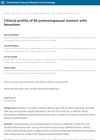 January 2020 in “Open Journal of Obstetrics and Gynecology”
January 2020 in “Open Journal of Obstetrics and Gynecology” All women with Polycystic Ovary Syndrome (PCOS) in a study had at least one skin disorder, with the most common being excessive hair growth, acne, dark skin patches, hair loss, and oily skin.
 July 2019 in “International journal of reproduction, contraception, obstetrics and gynecology”
July 2019 in “International journal of reproduction, contraception, obstetrics and gynecology” Obesity greatly affects polycystic ovarian syndrome, and losing weight should be the first treatment for obese patients to improve their chances of ovulation and pregnancy.
 April 2019 in “International Journal of Research in Dermatology”
April 2019 in “International Journal of Research in Dermatology” Most women with hirsutism have mild symptoms and often experience acne, menstrual irregularities, and obesity.
 March 2019 in “Journal of Investigative Dermatology”
March 2019 in “Journal of Investigative Dermatology” Seborrheic dermatitis is influenced by diet, genetics, and psychological factors.
 January 2019 in “ISGE series”
January 2019 in “ISGE series” The document concludes that effectively managing PCOS requires a multifaceted approach.
 February 2018 in “InTech eBooks”
February 2018 in “InTech eBooks” Diagnosing and treating PCOS is complex due to differing criteria and requires a team approach.
 January 2018 in “Springer eBooks”
January 2018 in “Springer eBooks” Athletes need effective management of skin disorders for their performance and well-being.
 January 2018 in “Springer eBooks”
January 2018 in “Springer eBooks” Different races and genders have unique skin and hair issues, requiring specialized care and more research for effective treatment.

Tailored nonsurgical cosmetic procedures are crucial for safely treating diverse skin types, especially skin of color.
 November 2017 in “Elsevier eBooks”
November 2017 in “Elsevier eBooks” PCOS is a genetic disorder affecting women's reproductive health, with treatments focused on symptoms like insulin resistance and fertility.









